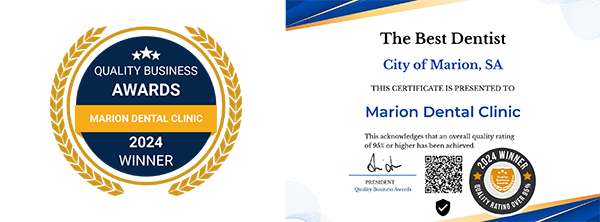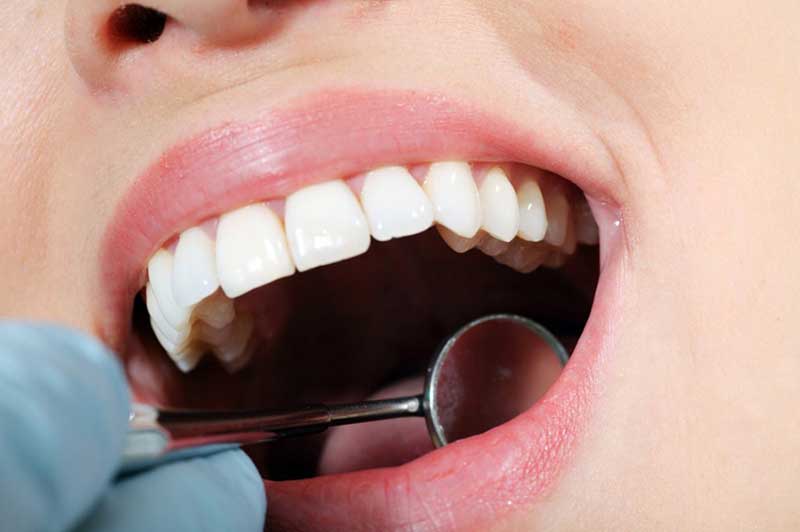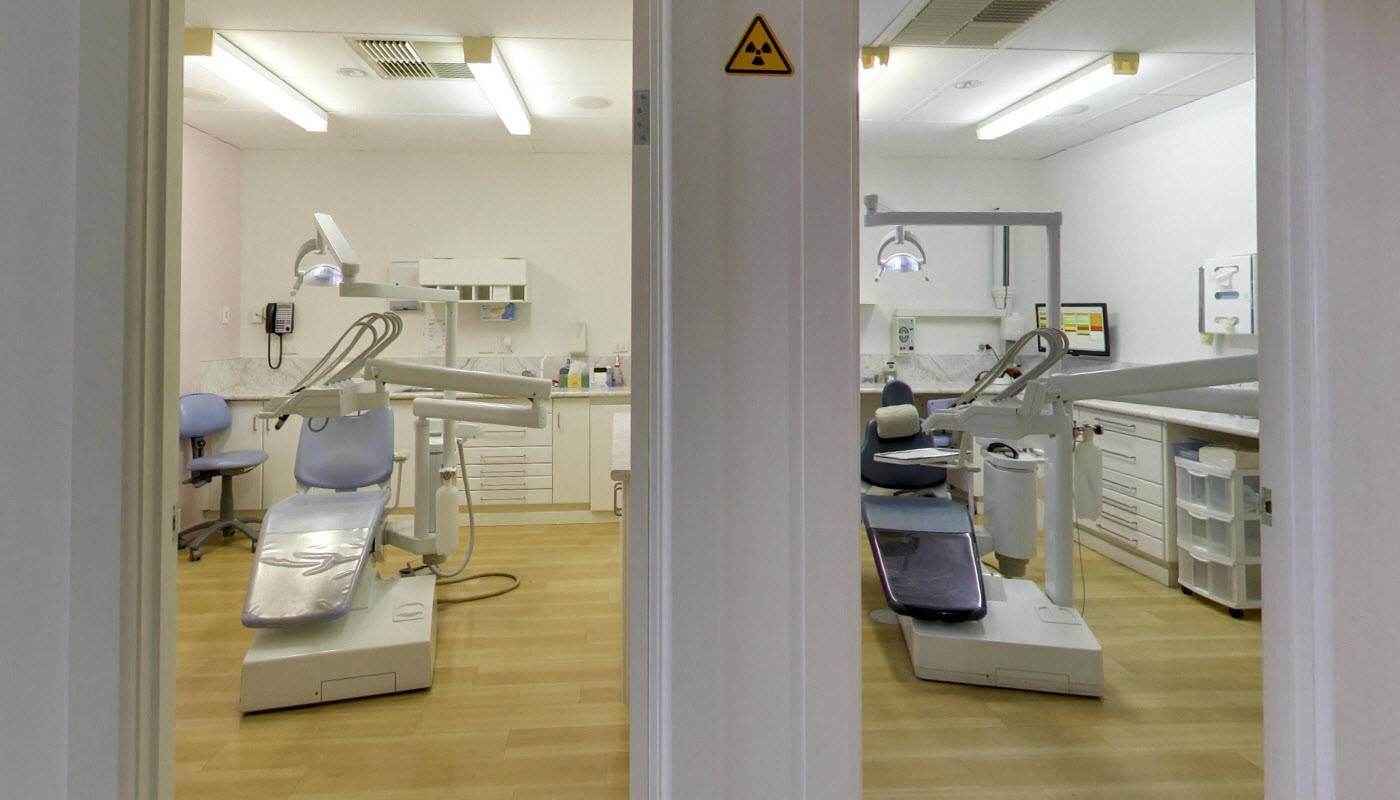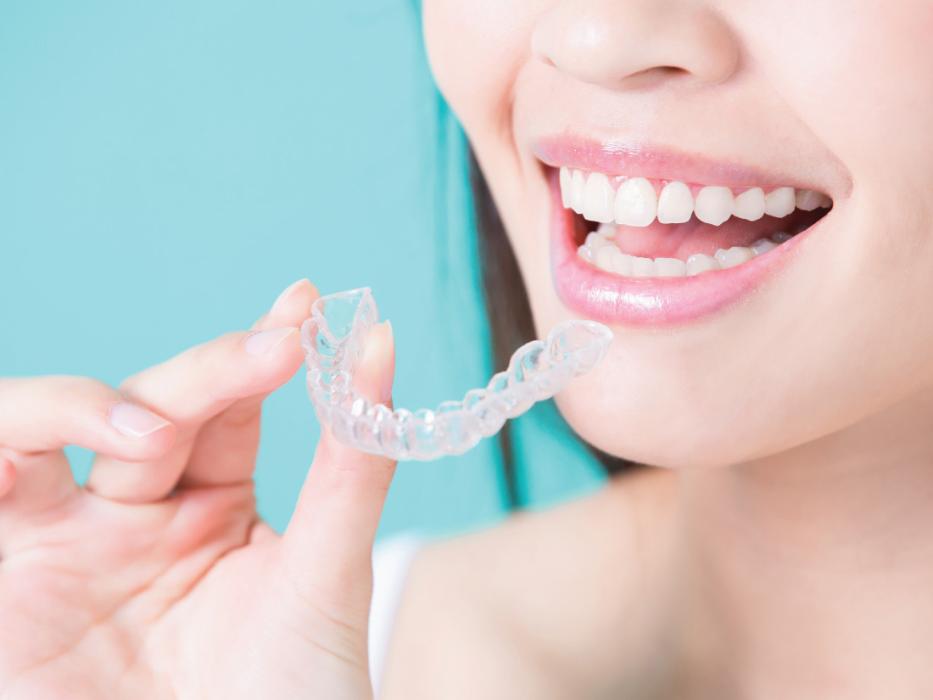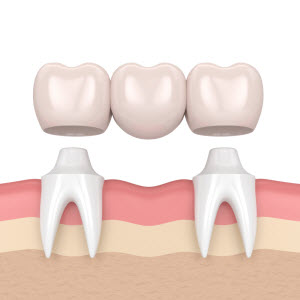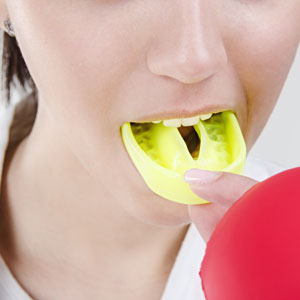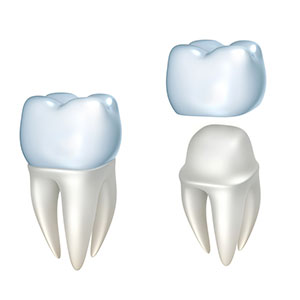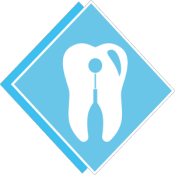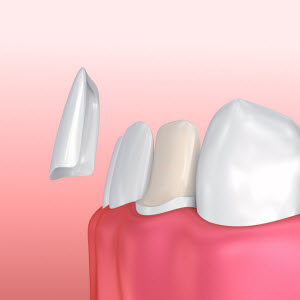YOUR ORAL HEALTH
The connection between general health and oral health
> Poor oral health is significantly associated with major chronic diseases
> Poor oral health causes disability
> Oral health issues and major diseases share common risk factors
> General health problems may cause or worsen oral health conditions.
Click here to view the report
Marion Dental Clinic
What is good oral hygiene
Good oral hygiene results in a mouth that looks and smells healthy. This means:
> Your teeth are clean and free of debris
> Gums are pink and do not hurt or bleed when you brush or floss
> Bad breath is not a constant problem
If your gums do hurt or bleed while brushing or flossing, or you are experiencing persistent bad breath, see your dentist. Any of these conditions may indicate a problem.
Your dentist or hygienist can help you learn good oral hygiene techniques and can help point out areas of your mouth that may require extra attention during brushing and flossing.
How is Good Oral Hygiene Practiced?
Maintaining good oral hygiene is one of the most important things you can do for your teeth and gums. Healthy teeth not only enable you to look and feel good, they make it possible to eat and speak properly. Good oral health is important to your overall well-being.
Daily preventive care, including proper brushing and flossing, will help stop problems before they develop and is much less painful, expensive, and worrisome than treating conditions that have been allowed to progress.
In between regular visits to the dentist, there are simple steps that each of us can take to greatly decrease the risk of developing tooth decay, gum disease and other dental problems. These include:
> Brushing thoroughly twice a day and flossing daily
> Eating a balanced diet and limiting snacks between meals
> Using dental products that contain fluoride, including toothpaste
> Rinsing with a fluoride mouth rinse if your dentist tells you to
> Making sure that your children under 12 drink fluoridated water or take a fluoride supplement if they live in a non-fluoridated area.
Saliva and chewing gum
What does chewing gum do?
Sugar-free chewing gum has a positive benefit for dental health by increasing salivary flow during chewing, which helps to dilute and neutralise plaque acidity. There is general scientific agreement now that chewing sugar free gum amongst other things can help to protect teeth against decay.
Over the last twenty years there has been considerable clinical research into the effect of salivary stimulation and the role of saliva in oral health. Clinical evidence suggests that not only does sugar-free gum not decay teeth but that, when chewed after meals and snacks, it will reduce the acidic effects caused by other foods. In addition to brushing teeth and gums regularly with a fluoride toothpaste, it is now recognised that chewing sugar-free gum can contribute to oral health through potential prevention of tooth decay.
What does saliva do?
Saliva is the mouth’s most important natural defence mechanism. It bathes the plaque on teeth and helps to neutralise the acids and wash away sugars. This effect is enhanced if salivary flow after sugary snacks is stimulated – with fruit, vegetables, cheese, for example, or with sugar-free chewing gum, which has the advantage of prolonged chewing.
At the earliest stages of the decay process, the tooth surface may ‘heal’ by deposition of essential minerals from saliva calcium and phosphate together with fluoride which accelerates the process of remineralisation. Saliva also helps to wash away the remains of food trapped in the hard-to-reach areas of the mouth.
What happens when you chew sugar-free gum?
Both the chewing action and the taste of sugar-free gum stimulate the production of extra saliva by up to 10 times its normal rate. When salivary flow is stimulated its composition changes, the concentration of bicarbonate increases, enhancing its ability to neutralise plaque acid. Also, as salivary flow increases, the availability of minerals is increased, helping to repair early tooth decay.
Dental hygiene and sugar-free gum
The most important messages for oral health are to:
- Clean the teeth and gums thoroughly twice every day with a fluoride toothpaste
- Reduce the consumption, and especially the frequency of intake of sugar-containing food and drink
- Have an oral examination every six months or year
When tooth brushing is not practical after meals and snacks, chewing sugar-free gum is a help, but it should not replace any aspect of routine dental hygiene. If used, sugar-free gum should, ideally, be chewed for around twenty minutes in order to maximise the dental benefits.
Can sugar-free gum help relieve xerostomia (dry mouth)?
Patients with dry mouth are more susceptible to tooth decay as their flow rate, pH level and buffering capacity is lowered. Patients are often recommended to chew sugar-free gum to relieve the symptoms of dry mouth and also to help encourage the function of the salivary gland.
How much should you chew a day?
Sugar-free gum is sweet because it uses non sugar sweeteners sorbitol and xylitol especially. These sweeteners can cause short term gastrointestinal problems if taken in excess. This may occur with products where the amounts consumed are larger, but with chewing gum, the amounts consumed are very small and cannot under normal usage give rise to such problems.
Sugar-free chewing gum can be chewed by anyone from school age upwards. Dentists recommend that school-age children are advised by their parents on the appropriate use of gum for health benefit.
Will any type of gum do?
Dentists would only recommend a Sugar-Free gum.
Your Diet and Dental Health
Not only is your diet important to your general health, it is also important to your dental health. If you do not eat a balanced diet, you are more likely to get tooth decay and gum disease. Developing teeth can also be affected. Children who have a poor diet are more likely to have dental problems. Likewise, pregnant women need balanced diets for their babies’ teeth to develop normally.
How does the food you eat cause tooth decay?
When you eat, food passes through your mouth. Here it meets the germs, or bacteria, that live in your mouth. You may have heard your dentist talk about plaque. Plaque is a sticky film of bacteria. These bacteria love sugars and starches found in many foods and many purchased drinks which can have a surprising amount of sugar added. When you don’t clean your teeth after eating, plaque bacteria use the sugar and starch to produce acids that can destroy the hard surface of the tooth, called enamel. After a while, tooth decay occurs. The more often you eat and the longer foods are in your mouth, the more damage occurs.
Choose foods wisely
Some foods that you would least expect contain sugars or starches. Some examples are fruits, milk, bread, cereals and even vegetables. The key to choosing foods wisely is not to avoid these foods, but to think before you eat. Not only what you eat but when you eat makes a big difference in your dental health. Eat a balanced diet and limit between-meal snacks. If you are on a special diet, keep your physician’s advice in mind when choosing foods.
For good dental health, keep these tips in mind when choosing your meals and snacks. Carbonated and sports drinks are often very acidic as well as having sugar added. Understand what you eat and drink and it will help you make informed choices about your diet
Tips for better dental health
To get a balanced diet, eat a variety of foods.
Choose foods from each of the five major food groups:
- breads, cereals and other grain products
- fruits
- vegetables
- meat, poultry and fish
- milk, cheese and yogurt
Limit the number of snacks that you eat.
Each time you eat food that contains sugars or starches, the teeth are attacked by acids for 20 minutes or more. If you do snack, choose nutritious foods, such as cheese, raw vegetables, plain yoghurt, or a piece of fruit.
Foods that are eaten as part of a meal cause less harm. More saliva is released during a meal, which helps wash foods from the mouth and helps lessen the effects of acids. Brush twice a day with a fluoride toothpaste that has the Australian Dental Association Seal of Acceptance.
Clean between your teeth daily with floss or interdental cleaners.
Visit your dentist regularly.
Your dentist can help prevent problems from occurring and catch those that do occur while they are easy to treat.
Oral hygiene for babies and toddlers
Please read the information in the following website – Oral Health For Infants And Toddlers
The breath problem
Why Do We Have a Breath Problem?
Bad breath, a condition with many causes, is sometimes called halitosis or oral malodour. The odour of the breath may change with the cause but the result is generally an unpleasant, chronic, irritating problem that erodes the individuals self image.
1. Mouth Odours Caused by Foods That We Eat
One of the most common causes of offensive breath is the food that we eat. For example, foods prepared with garlic or onions taste delicious at the time of the meal but often leave an unpleasant breath odour (and sometimes body odour) for many hours. Foods that are highly spiced, have a high fat content or contain sulphur may cause a temporary problem. Breath tainted with food odours is not considered true “bad breath”. It is now socially acceptable to eat foods that contain garlic and onions.
Others in your social group who have indulged in the same foods will not find your mouth odour unpleasant, in fact may not even notice it. We choose the foods we eat voluntarily. If we find the odour unsettling, that food could be easily avoided.
2. Hunger Odour
Hunger odour is most noticeable in those individuals who eat infequently, as many do when they are on a diet. Anyone who is in the habit of skipping meals, fasting or simply not eating enough can have hunger breath. The result is a very objectionable breath odour that remains even after brushing. This odour is ketosis and is the incomplete use of body fats for energy. It happens when there is a lack of available carbohydrate in the diet.
Fruits and fruit juices are good examples of carbohydrate rich foods that, when used as snacks, will help to control hunger odour.
3. Morning Breath
If we experience a bad taste and odour when we first wake up in the morning, we have morning breath.
When we sleep the glands that produce saliva also rest and the amount of wetness in the mouth is minimal. This amount is not enough to wash away some of the food debris that has been left on or between the teeth even after careful brushing. These conditions allow odour producing bacteria to grow rapidly on the tongue and teeth.
Morning breath is a temporary condition that can be easily eliminated with a good tooth brushing and breakfast.
4. Systemic Diseases and Conditions
Many systemic diseases and conditions have their own characteristic breath odour when they are not under control. This odour is useful because it can help us to diagnose the condition. Some examples are the fruity odour associated with diabetes, the fishy odour that alerts us to possible kidney failure, and the strong cheesy odour of infected tonsils.
Sinusitis may contribute considerably to bad breath as the discharge can be foul smelling. Other conditions such as allergies and post nasal drip may also be factors.
There is virtually no part played by the stomach in the production of halitosis unless the person regurgitates or burps.
5. Drug Intake
Drugs such as alcohol or tranquilizers are exhaled through the lungs and add their own distinctive odour to other chemicals that make up mouth air. Some of these drugs contribute to a dry mouth that further increases the intensity of the breath problem.
6. Dental Diseases
Individuals who have cavities, inflamed gums or periodontal disease may have very unpleasant and pungent breath problems. The breath problem generally disappears when the conditions are corrected.
7. Hormonal Changes
Hormonal changes such as those that occur during menstruation can contribute to bad breath. Noticed around the time of ovulation and just before menses, it has been described as a mousy odour.
8. Stress
There is increasing indication that stress may play a role in bad breath. When we are stressed, our mouths are very dry. A thick coating on the tongue may result from the dry mouth. Tongue coatings can have a very unpleasant odour.
9. Subjective Halitosis
Subjective halitosis can occur and is often a serious problem for the afflicted individual. This is a condition where individuals with a disordered sense of smell believe they have severe halitosis. However, there is no detectable odour.
10. Bacteria
When there is a noticeable breath problem but the cause is not apparent, it is most often caused by bacteria present in the mouth, throat, lungs or sinuses. These bacteria prefer an oxygen-free environment and obtain their energy from proteins. Protein is very available to the bacteria in the form of plaque, food debris and dead cells.
Some bacteria attack living cell tissue as well. Most bacteria use components of proteins called amino acids, primarily cystine and methionine for their nutrition. They may utilise hydrogen and proteins from saliva. The products of their digestion are volatile (gaseous) sulphur compounds, butyric, acetic and propionic acids.
How quickly the breath returns to normal varies with each individual. Some individuals take longer to bring this problem under control. It takes time, patience and working with the staff at the clinic to achieve the proper results. It is encouraging to note that this treatment is generally very successful.
Why do I need to floss?
Flossing helps remove food and plaque from the areas between your teeth where the toothbrush can’t reach. The bacteria in between your teeth can cause way more damage than the plaque and bacteria on the front and back of your teeth. If not removed, plaque can eventually harden into calculus or tartar, which leads to gum disease and cavities in your teeth.
Flossing causes my gum to bleed. Should I continue flossing?
Healthy gums do not have enough of a blood supply to bleed, no matter how hard you brush or floss. You can go in between healthy gums with a sharp dental instrument and not only they don’t bleed, they aren’t even tender.
Unhealthy gums have too much blood in them so they bleed. Your body sends blood to your gums to fight off the infection and bacteria. Therefore, the more you floss, the healthier your gums get, the less they bleed.
Should I whiten my teeth?
Teeth whitening is not for everyone. Before choosing to whiten your teeth it is important to see our dentist to determine if your teeth are suitable for the treatment.
Unlike many untrained operators offering teeth whitening treatments, only dentists can assess a person’s suitability for the treatment. Without a proper assessment it is not possible to rule out any permanent side effects or other risks associated with the process. If administered by untrained individuals, whitening procedures can cause discoloured teeth, heightened tooth sensitivity and gum problems.
How do whitening toothpastes work and how effective are they?
Whitening toothpastes can help remove surface stains only and do not contain bleach. Over-the-counter and professional whitening products contain hydrogen peroxide (a bleaching substance) that helps remove stains on the tooth surface as well as stains deep in the tooth. None of the home use whitening toothpastes can come even close to producing the bleaching effect you get from your dentist’s office through chair-side bleaching.
Quality Dentistry for All Ages
Contact us today to schedule a convenient appointment for the entire family.
Contact Info
Opening Hours
Our Services
Find Us
If you are with a health fund, you may be eligible for our new patient no gap promotion.
Dentist Marion & Mitchell Park SA | Marion Dental Clinic
Proudly serving all Southern Adelaide suburbs including Marion, Mitchell Park, Oaklands Park, Seacombe Gardens, Bedford Park & Darlington
